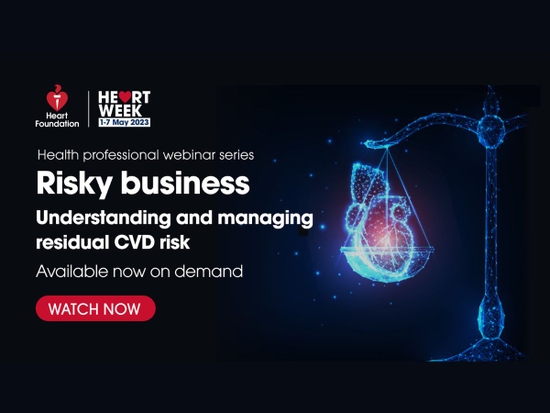
Clinical webinars
Explore our heart health webinars for healthcare professionals
Our clinical webinar series is a go-to education resource for primary healthcare professionals, providing the latest evidence-based insights on cardiovascular disease (CVD) prevention and management. Designed to support ongoing professional development, these webinars provide practical guidance to enhance clinical practice and improve patient outcomes.
Accredited by the Royal Australian College of General Practitioners (RACGP), for continuing professional development (CPD), and presented by leading Australian and international experts, our on-demand webinar series translates emerging research and clinical guidelines into real-world applications, enhancing both knowledge and confidence in the prevention, detection, and management of CVD.
To receive updates on our upcoming clinical webinars, subscribe to the Heart Health Network newsletter.
Accredited webinars
Our webinar series is accredited with the RACGP for the 2026 to 2028 triennium. This clinical education equips primary healthcare professionals with free, evidence-based knowledge, bridging clinical insights with practical application to support the early prevention, detection, and management of CVD. Accessible anytime, our series offers a flexible and convenient way to stay up to date with best practices in cardiovascular health.
Catch up on our latest webinar
Non-accredited webinars
Our non-accredited webinar series keeps primary care health professionals up to date with key cardiovascular advancements and updates from the past decade. Previously accredited and delivered by leading Australian and international experts in their field, these on-demand webinars remain a valuable, evidence-based, self-learning resource, offering flexible, anytime access to essential insights in cardiovascular care.
2022

Webinar: Heart-healthy eating simplified: a recipe for effective behaviour change
Poor diet is a leading risk factor of coronary heart disease, contributing to 50% of the total burden of heart disease. Furthermore, disease burden attributed to dietary risks is not distributed equally across Australia.

Webinar: Filtering through the impact of chronic kidney disease on CVD
Cardiovascular disease (CVD) is the leading cause of morbidity and mortality in people living with chronic kidney disease (CKD). Even after adjusting for traditional risk factors, CVD is associated with an increased risk of all-cause and cardiovascular mortality.1 There is an independent inverse association between reduced estimated glomerular filtration rate (eGFR) and, albuminuria, and increased cardiovascular mortality.2,3

Webinar: Unpacking diabetes and the heart: Latest on risk and management strategies
People with diabetes are up to four times more likely to have a heart attack or stroke, often regarded as the risk equivalent to someone who has previously had a heart attack or stroke.1,2 They also face cardiovascular disease (CVD) as the leading cause of death.3 Managing CVD risk in this group is undoubtedly critical.
2021-22

Webinar: Lipid lowering landscape: New and emerging treatment approaches
Streamed live during Heart Week 2022, this webinar explores the latest evidence on the management of high cholesterol in the context of cardiovascular risk reduction. Panellists discuss new and emerging pharmacological strategies for lipid lowering and translate the latest evidence to support preventative CVD risk assessment and management.

Webinar: Pressure rising - Clinical controversies and updates in hypertension
Hypertension is responsible for the largest burden of cardiovascular disease (CVD) in Australia.1 Even with gradual improvements in awareness and management, a significant proportion of hypertensive adults still fail to achieve recommended blood pressure (BP) targets.2

Webinar: Lipids in the limelight: clinical update on screening and management
High cholesterol contributes to over a third of coronary heart disease burden. Despite well-established evidence supporting the benefits of cholesterol lowering for the prevention of cardiovascular disease (CVD), many patients fail to meet their lipid targets.
_(1).jpg?width=550&height=auto&format=pjpg&auto=webp)


.jpg?width=550&height=auto&format=pjpg&auto=webp)




